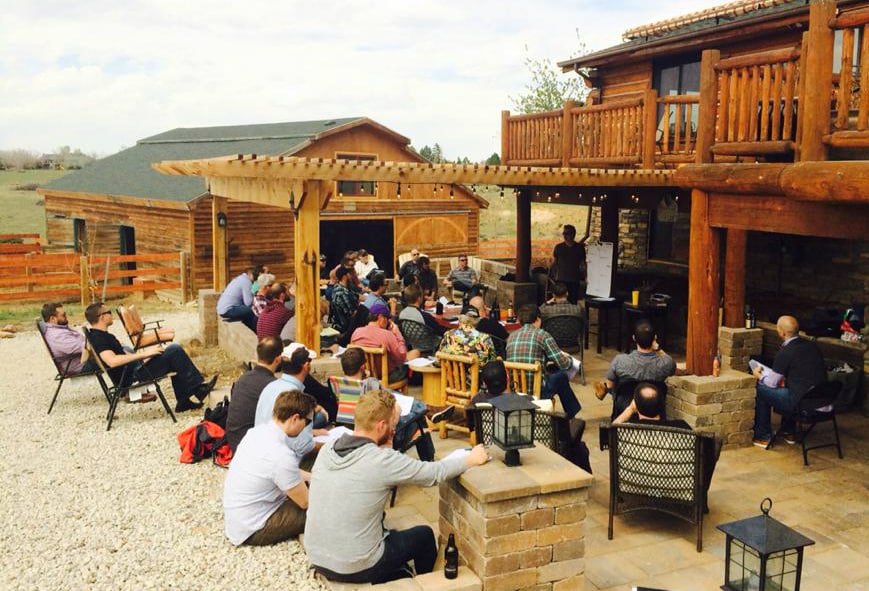My good buddy Hugh Halter and I have sort of been rejoicing and commiserating lately as to how long we’ve actually been doing ministry (in its various forms) and trying to lead others in a lifestyle of discipleship and mission. Man, we’re getting old bro!
Becoming a Journeymen
And we wrestled with the things that we feel have allowed us to stay in the game for the long haul and not tap out, burn out or disqualify ourselves. How did we come to be “Journeymen”?
There have been similar patterns to our journeys and we’ve actually come up with seven things that we believe all leaders need to commit to in order to stay in and finish well. We’ve come to articulate them in the form of “oaths” that every leader should commit to. Let me share the second of the seven…
#2 “I Commit to Move at God’s Pace and Measure what God Measures.”
If we’re going to be leaders that last and not chase hard after the latest fads, public (or elder board) opinions and wrong measurements, we’re going to need to commit to letting God set the speed and metrics.
A Pattern and a Promise
There is a reason Jesus lived and taught in the ways he did. He wasn’t random or cleverly trying to adapt to the local customs of his day. Yes, his methods were rooted in real life and they were immersed into his culture, but there was something far more eternal and subversive going on. Jesus was on his Father’s mission, restoring all things to the way he originally created them to be. His life and teachings provide both the example for us and open up a new possibility—for people to once again live in a close relationship with God under his rule and reign. Jesus taught in parables that offered his disciples (and us) a pattern and a promise for life in the kingdom: “For who hath despised the day of small things?”i [clickToTweet tweet=”There is a reason Jesus lived and taught in the ways he did. He was on his Father’s mission.” quote=”There is a reason Jesus lived and taught in the ways he did. He was on his Father’s mission.”]
In Luke 13 we encounter Jesus explaining how the good news of the kingdom—what we commonly refer to as the gospel—works itself out, starting with the basic principle small is big.
Jesus asked, “What is the kingdom of God like? What shall I compare it to? It is like a mustard seed, which a man took and planted in his garden. It grew and became a tree, and the birds perched in its branches.”ii
The pattern here is clear and simple. This new kingdom restoration doesn’t start off big, with everyone jumping on board. Notice that Jesus tells us that the little mustard seed is first planted in the man’s own garden. After it is planted, it grows into something larger, something that others can find their place in. There are many small steps on the journey to a kingdom life lived with Jesus on his mission. All of your steps will be baby steps at first.
The promise is also clear. After the good news of the kingdom takes root and changes your own heart, Jesus promises it will expand outward to include others. The seemingly small first steps you take to cultivate growth in your own life will grow over time and have a larger effect on others.
We are not called to build elaborate, structured programs and systems and then expect lots of people to come on in and fill them up for us. Instead, we are to plant small (gospel) seeds that will eventually grow into changed lives, changed families, and changed communities.
Small is big. It’s important to remember this if you plan to stay in ministry and on mission. That’s the first kingdom principle that Jesus taught. But it wasn’t the only one. Continuing with his disciples, Jesus taught them another kingdom code: slow is fast.
Again he [Jesus] asked, “What shall I compare the kingdom of God to? It is like yeast that a woman took and mixed into about sixty pounds of flour until it worked all through the dough.”iii
The pattern: Like yeast, a catalyst for change and growth, the gospel begins to affect our lives slowly at first, igniting a change within us that influences every aspect of our existence.
The promise: The good news of the kingdom is about more than just our afterlife, what happens to us when we die. Christianity is about more than sin, heaven, and hell. Jesus’ kingdom rule and reign is present now, and it transforms everything about us. It changes our perspectives and priorities, our motives and methods. Living on God’s mission of making disciples is about small shifts in belief and practice that over time make a big difference. Just as a ball of dough takes time to rise, we need to be patient with God’s process of change and growth in our hearts and lives. Slow is fast.
Multiplication Wins!
There is an underlying principle in both of these parables, a goal that these two principles lead to: multiplication. The good news of Jesus’ kingdom rule and reign is not just about the small changes in your life that lead to transformation over time, nor is it simply a matter of taking time and having the patience to do the right things. Both of these parables teach us that life in the kingdom always leads to multiplication. And multiplication always beats out hard work, sacrifice, and big goals and dreams, eventually changing the world.
It is interesting to me that in Matthew’s gospel, right after he records these two parables, he shows Jesus continuing on with back-to-back parables on how valuable the kingdom of God is:
“The kingdom of heaven is like treasure hidden in a field. When a man found it, he hid it again, and then in his joy went and sold all he had and bought that field. “Again, the kingdom of heaven is like a merchant looking for fine pearls. When he found one of great value, he went away and sold everything he had and bought it.”iv
After sharing these two short parables, Jesus wraps up his teaching time with the disciples by telling them a final parable about some fishermen who let down their nets to catch “all kinds of fish.”
This would have likely reminded them of an earlier time when Jesus commanded Peter and his buddies to throw out their nets after a long night of fishing.v When they pulled the nets back into their boat, they were overflowing with fish to the point of breaking! The fishermen were amazed at this miracle, and it’s almost as if Jesus is saying to them, “That’s how I roll!” He wants them to understand that the kingdom life will always lead to expansion and abundance. He is saying to them, “Healthy things grow. They multiply. And that’s how God has ordered all of life. And I am going to show you how to live this way and teach others as well.”
Ok, so there’s the first part of this “Journeymen” oath. As leaders we really need to see the world–God’s world–and ministry the way that Jesus says it truly works. We need to move at God’s pace.
Small is big, slow is fast and multiplication wins every time.
Next week I’ll lay part two of this on you: Measure what God measures.
If you’re interested in a unique environment where we teach you all 7 of the Journeymen Oaths, join me and Hugh Halter at his ranch.
Missional Leadership at the next level… The things you’ll wish you had talked about 10 years from now–TODAY!
Hope to see you soon…
Caesar & Hugh
[Comments from my old website/blog were not carried over to this new one. Please leave your thoughts below.]






